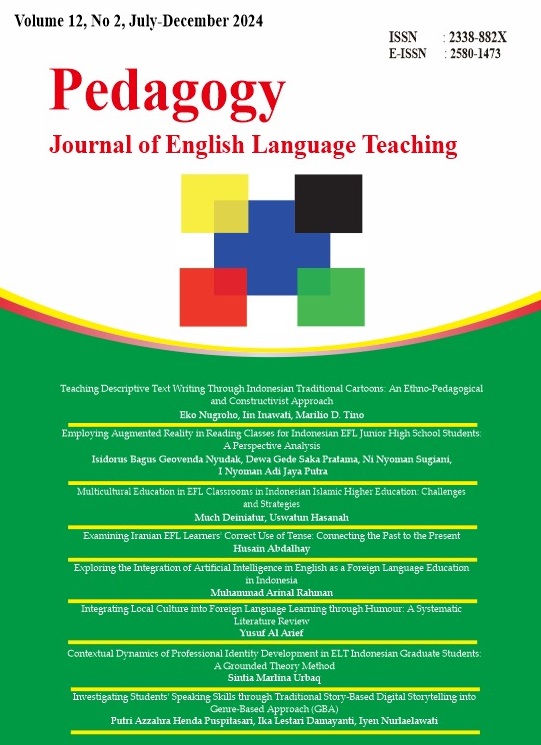Contextual Dynamics of Professional Identity Development in ELT Indonesian Graduate Students: A Grounded Theory Method
DOI:
https://doi.org/10.32332/joelt.v12i2.9566Keywords:
ELT professional identity, ELT graduate student, grounded theory, identity construction, identity developmentAbstract
Through the ever-changing nature of globalized English Language Teaching (ELT) enterprises, graduate students are urged to engage in ELT to continuously construct, develop, and improve individual professional identity (PI) which is very essential. This process is crucial for students to be recognized as competent teachers and as respected professional in ELT community, creating opportunities for achieving individual future career aspirations. Therefore, this research aimed to explore the impact of cultural environment and personal experience in the development of ELT professional, examining the interplay between self-identified PI, individual identity development strategies, and personal cultural education among ELT graduates. The research applied grounded theory method and used interviews as the major instrument to gather data from four ELT Indonesian graduate students with diverse backgrounds and experiences. The outcome of this finding showed that ELT graduates had firmly defined individual PI as intermediate-level professional, skills teachers, and multi-students of experts in the field of ELT. Moreover, partakers crafted and refined this identity by following self-identification and expanded personal insights through additional teaching or programs such as refining teaching skills, research capabilities, and active engagement in community service. Diverse professional backgrounds of ELT graduates impacted individual level of PI development. During this research, two participants showed a high level, while others signified a moderate, and a low level of PI. Those with a high level were teachers in formal and informal settings.
References
REFERENCES
Bandura, A. (1986). Social Foundation of Thought and Action: A Social Cognitive Theory. Prentice-Hall, Inc.
Barbarà-i-Molinero, A., Cascón-Pereira, R., & Hernández-Lara, A. (2017, 3). Professional identity development in higher education: influencing factors. International Journal of Educational Management, 31(2), 189-203. https://doi.org/10.1108/IJEM-05-2015-0058.
Barkhuizen, G. (2017). Reflections on language teacher identity research. Routledge.
Britzman, D. P. (2003). Practice makes practice: A critical research of learning to teach. New York Press.
Caldas, B. (2019, 12). To switch or not to switch: Bilingual preservice teachers and translanguaging in teaching and learning. TESOL Journal, 10(4). https://doi.org/10.1002/tesj.485.
Crowe, F., & McGarr, O. (2022, 7). “Foreclosing” a teaching career? An exploration of the career decisions of undergraduate pre-service teachers’ through the lens of Identity Status Theory. Teaching and Teacher Education, 115, 103744. https: //doi.org/10.1016/j.tate.2022.103744.
Danielewicz, J. (2001). Teaching selves: Iden-tity, pedagogy, and teacher education. New York Press.
Day, C. (2018). Professional Identity Matters: Agency, Emotions, and Resilience. Research on Teacher Identity, 61-70. https://doi.org/10.1007/978-3- 319-93836-3_6.
Goktepe, F., & Kunt, N. (2020). “I’ll do it in my own class”: Novice language teacher identity construction in Turkey. Asia Pasific Journal, 1-16.
Heled, E., & Davidovitch, N. (2019, 11). The Impact of Academic, Personal, and Professional Attributes on the Occupational Identity of School Counselors in Israel. International Journal of Educational Methodology, 5(4), 513-523. https://doi.org/ 10.12973/ijem.5.4.513.
Nalipay, M., Mordeno, I., Semilla, J.-r., & Frondozo, C. (2019, 8). Implicit Beliefs about Teaching Ability, Teacher Emotions, and Teaching Satisfaction. The Asia-Pacific Education Research, 28(4), 313-325. https://doi.org/10.1007/s40299-019-00467-z.
Öztürk, G., & Gürbüz, N. (2017, 1). Re-defining language teacher cognition through a data-driven model: The case of three EFL teachers. Cogent Education, 4(1), 1290333. http://dx.doi.org/10.1080/2331186X.2017.1290333.
Pakpahan, F. H., & Saragih, M. (2022). Theory of Cognitive Development by Jean Piage. Journal Applied Linguistics. doi:http://dx.doi.org/10.52622/joal.v2i2.79
Qoyyimah, U., Singh, P., Exley, B., Doherty, c., & Yosi, A. (2020). Professional Identity and Imagined Student. Journal of Language, Identity & Education. doi: https://doi.org/10.1080/15348458.2020.1833726
Ruohotie-Lyhty, M., & Pitkänen-Huhta, A. (2022). Status versus nature of work: Pre-service language teachers envisioning their future profession. European Journal of Teacher Education, 45(2), 193–212. https://doi.org/10.1080/02619768.2020.1788535.
Safari, P. (2018). A critical reflection on (re)construction of my identity as an English language studentsand English teacher. Professional Development in Education, 44(5), 704-720. https://doi.org/10.1080/-19415257.2017.1387866.
Safari, P. (2020). Iranian ELT Student Teachers’ portrayal of their identities as an English language teacher: Drawings speak louder than words. Journal of Language, Identity & Education, 19(2), 125–141. https://doi.org/10.1080/15348458.2019.1650279.
Sardabi, N., Biria, R., & Golestan, A. (2018, 7). Reshaping Teacher Professional Identity through Critical Pedagogy-Informed Teacher Education. International Journal of Instruction, 11(3), 617-634. https://doi.org/10.12973/iji.2018.11342a.
Scheepers, D., & Ellemers, N. (2019). Social Identity Theory. Social Psychology in Action, 129-143. https://doi.org/10.1007/978-3-030-13788-5_9.
Stets, J., & Burke, P. (2000, 9). Identity Theory and Social Identity Theory. Social Psychology Quarterly, 63(3), 224. https://doi.org/10.2307/2695870.
Strauss, A., & Corbin, J. (2008). Basics of Qualitative Research: Techniques and Procedures for Developing Grounded Theory (3rd ed.). (3 ed.). Sage Publication.
Tomlinson, M., & Jackson, D. (2021, 4). Professional identity formation in contemporary higher education students. Investigations in Higher Education, 46(4), 885-900. https://doi.org/10.1080/03075079.2019.1659763.
Vallente, J. (2020, 11). Framing pre-service English language teachers’ identity formation within the theory of alignment as mode of belonging in community of practice. Teaching and Teacher Education, 96, 103177. https://doi.org/10.1016/j.tate.2020.103177.
Whitaker, M. (2020, 11). Us and Them: Using Social Identity Theory to Explain and Re-envision Teacher–Student Relationships in Urban Schools. The Urban Review, 52(4), 691-707. https://doi.org/10.1007-/s11256-019-00539-w.
Widayati, A., MacCallum, J., & & Woods-McConney, A. (2021). Teachers’ perceptions of continuing professional development: a research of vocational high school teachers in Indonesia. Teacher Development. doi:https://doi.org/10.1080/13664530.2021.1933159
Wijaya, K. (2021). English education master students’ perceptions on their professional identity as future EFL teachers. Journal of English Language and Pedagogy, 4(2), 35-48. http://dx.doi.org/10.36597-/jelp.v4i2.10773.
Yazan, B. (2018, 7). Being and becoming an ESOL teacher through coursework and internship: Three teacher candidates’ identity negotiation. Critical Inquiry in Language Investigations, 15(3), 205-227. https://doi.org/10.1080/15427587.2017.1408014.
Downloads
Published
Issue
Section
License
Copyright (c) 2024 Sintia Marlina Urbaq

This work is licensed under a Creative Commons Attribution-ShareAlike 4.0 International License.
















